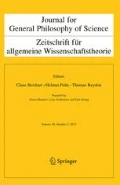References
Bovens, L., & Hartmann, S. (2003). Bayesian epistemology. Oxford: Clarendon Press.
Brendel, E. (2013). Wissen. Berlin/New York: de Gruyter.
Brogaard, B. (2009). What Mary did yesterday: Reflections on knowledge-wh. Philosophy and Phenomenological Research, 78(2), 439–467.
Craig, E. (1990). Knowledge and the state of nature: An Essay in Conceptual Synthesis. Oxford: Oxford University Press.
Daly, C. (Ed.). (2015). The Palgrave handbook of philosophical methods. London: Palgrave Macmillan.
Elgin, C. (2007). Understanding and the facts. Philosophical Studies, 132(1), 33–42.
Greco, J. (2014). Episteme: Knowledge and understanding. In K. Timpe & C. Boyd (Eds.), Virtues and their vices (pp. 287–302). Oxford: Oxford University Press.
Grimm, S. (2006). Is understanding a species of knowledge? British Journal for the Philosophy of Science, 57(3), 515–535.
Hills, A. (2015). Understanding why. Noûs, 49(2), 1–28.
Huber, F., & Schmidt-Petri, C. (Eds.). (2009). Degrees of belief. Dordrecht/New York: Springer.
Kelp, C. (2014). Knowledge, understanding and virtue. In A. Fairweather (Ed.), Virtue epistemology naturalized (pp. 347–360), Synthese Library 366. Switzerland: Springer International Publishing.
Kvanvig, J. (2003). The value of knowledge and the pursuit of understanding. Cambridge: Cambridge University Press.
Olsson, E. J. (2015). Gettier and the method of explication: A 60 year old solution to a 50 year old problem. Philosophical Studies, 172(1), 57–72.
Sliwa, P. (2015). Understanding and knowing. Proceedings of the Aristotelian Society, cxv(Part 1), 57–74.
Spohn, W. (2012). The laws of belief: Ranking theory and its philosophical applications. Oxford: Oxford University Press.
Stanley, J., & Williamson, T. (2001). Knowing how. The Journal of Philosophy, 98, 411–444.
Acknowledgments
Support for this research by a scholarship from the German Academic Exchange Service (DAAD) and by the Volkswagen Foundation for the project “A study in explanatory power” is gratefully acknowledged.
Author information
Authors and Affiliations
Corresponding author
Rights and permissions
About this article
Cite this article
Lawler, I. Dirk Koppelberg and Stefan Tolksdorf (eds): Erkenntnistheorie—Wie und wozu?. J Gen Philos Sci 47, 411–415 (2016). https://doi.org/10.1007/s10838-016-9349-5
Published:
Issue Date:
DOI: https://doi.org/10.1007/s10838-016-9349-5

